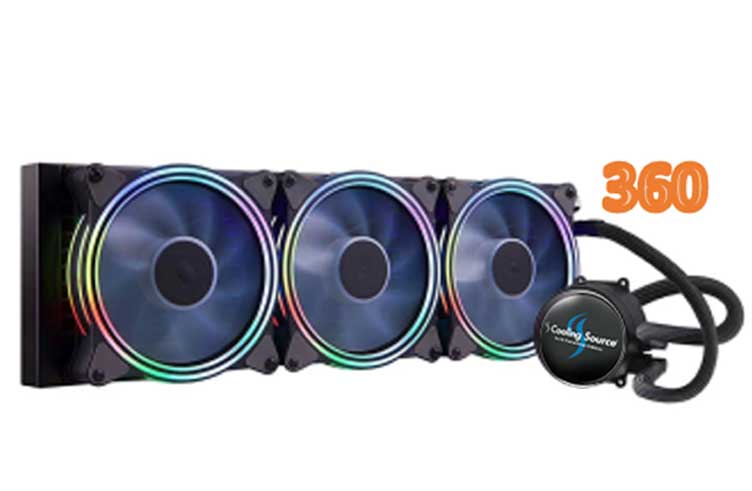WHAT IS THE BEST CPU COOLER?
What is the best CPU is a question for which there is no definitive solution. Essentially, the CPU cooler you choose must be able to keep the CPU at a reasonable temperature. The higher the temperature, the more energy a CPU Cooler consumed, which means a shorter lifespan and lower performance. Maintaining a low CPU temperature preserves your components and maintains stability.
HOW DOES A COOLER FOR A COMPUTER WORK?
A CPU cooler, expressed, cools the CPU by eliminating the heat created during operation. A cooler having a contact surface that links the cooler to the CPU serves this purpose. The heat imove throgh the heat sink, therefore away from the CPU . CSI manufacture CPU Coolier with high thermal conductivity metals, such as aluminum or copper. High-quality Thermal grease, such as Cooling Source DS-4000, improved this contact once more and increased cooling performance dramatically.
HOW DO I INSTALL A COMPUTER COOLER?
Customers can install CPU coolers in a variety of ways. Depending on the type of cooler, the installation procedure varies. For example, if there is no recess for adding cooling, the motherboard needs to be removed.
IS MY MOTHERBOARD COMPATIBLE WITH WHICH CPU COOLER?
It’s critical to check that the CPU cooler you’re using is compatible with the processor and socket you’re using. CSI designs and manufactures CPU coolers multi-compatible with AMD and Intel’s LGA 775, 1150/1155/1156, 1366, 2011, 2066, and AMD’s AM2(+), AM3(+), FM1 /2, and AMD AM4 Ryzen sockets.

WHAT ARE THE DISTINCTIVE TYPES OF PROCESSOR COOLERS?
Cooling Source manufacture CPU coolers in a variety of ways. There is a fundamental difference between air and water coolers.
COOLERS FOR THE AIR
Radial and tower air coolers are the two types of air coolers. The heat sink lies directly on the processor in radial coolers ), but in tower coolers, the heat sink and base plate connect to heat pipes. As a result, the fat-boiling liquid in the Heatpipe maximizes the rate of heat transfer.
COOLERS FOR WATER
A pump pushes the heat created by the components over water into a heat exchanger, consequently cooled by fans in liquid coolers. Closed systems — so-called “AIO coolers” and complicated “custom liquid cooling” are distinguished in the field of water cooling. Please get in touch with one of our engineers to discuss your application.
SHOULD I COOL WITH WATER OR WITH AIR?
The CPU cooler selection is primarily a matter of personal preference. WATER COOLING SYSTEMS are typically more powerful but also have a pump, making them more complicated. Consequently, they have another source of noise and a potential weak spot in addition to the fans, which is why many enthusiasts still swear by air cooling.
Different types of CPU coolers are recommended depending on the intended purpose and the case available.
A low-profile top-blower is suitable for a small HTPC but would be overworked in a high-end system with overclocking ambitions. A large tower CPU cooler or an AIO water cooler is also appropriate for gaming PCs or other high-performance systems, but it is overkill for a small office computer. On the other hand, in a high-end system with overclocking ambitions, a low-profile top blower is excellent for a compact HTPC. Still, it would be overkill in a high-end system with overclocking ambitions. Similarly, a large tower CPU cooler or AIO water cooling is suitable for gaming PCs and other high-performance systems, but it is too big for most other systems.

WHAT SHOULD BE TAKEN INTO ACCOUNT WHEN PURCHASING A CPU COOLER?
Before purchasing a CPU cooler, you should ask yourself the following questions:
COMPARISON AND TEST OF CPU COOLERS
As cooling experts, we at Cooling Source provide a diverse range of CPU coolers, giving the appropriate cooling solution for every need. Our signature has always been high quality and innovation at an excellent price-performance ratio. Also, CPU cooler manufactuerd by Cooling Source are certified by independent computer professionals and hardware enthusiasts worldwide.
WHICH APPLICATIONS ARE ON THE COMPUTER AT THE MOMENT?
A small low-profile cooler or a passive cooler is usually sufficient in a primary office PC. On the other hand, a powerful CPU cooler is required if demanding tasks such as gaming or video editing are planned.
WHAT ARE THE SPECIFICATIONS FOR COOLING CAPACITY AND NOISE LEVEL?
Is the system going to be overclocked? Then you’ll need a large tower CPU cooler or water cooling. If you want a quiet PC, how about a multimedia HTPC in the living room? Then passive cooling is desirable, or a low-profile cooler is a viable option.
WHICH TYPE OF COMPUTER CASE WILL BE USED?
There is ample room in big- or midi-towers for powerful tower CPU coolers or AIO water coolers. However, more extensive cooling solutions are likely to be unavailable in a compact system with modest dimensions.
Cart
Check out
My account
Contact us
Cooling Source Home page
